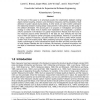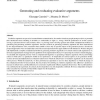516 search results - page 51 / 104 » A Critical Analysis of Empirical Research in Software Testin... |
MSR
2011
ACM
12 years 10 months ago
2011
ACM
A good understanding of the impact of different types of bugs on various project aspects is essential to improve software quality research and practice. For instance, we would ex...
JSS
2000
13 years 7 months ago
2000
The first goal of this paper is to empirically explore the relationships between existing object-oriented coupling, cohesion, and inheritance measures and the probability of fault...
IEEEPACT
2009
IEEE
2009
IEEE
Soft-OLP: Improving Hardware Cache Performance through Software-Controlled Object-Level Partitioning
14 years 2 months ago
—Performance degradation of memory-intensive programs caused by the LRU policy’s inability to handle weaklocality data accesses in the last level cache is increasingly serious ...
ICST
2009
IEEE
13 years 5 months ago
2009
IEEE
Measurement and detection of redundancy in test suites attempt to achieve test minimization which in turn can help reduce test maintenance costs, and to also ensure the integrity ...
AI
2006
Springer
13 years 7 months ago
2006
Springer
Evaluative arguments are pervasive in natural human communication. In countless situations people attempt to advise or persuade their interlocutors that something is desirable (vs...


